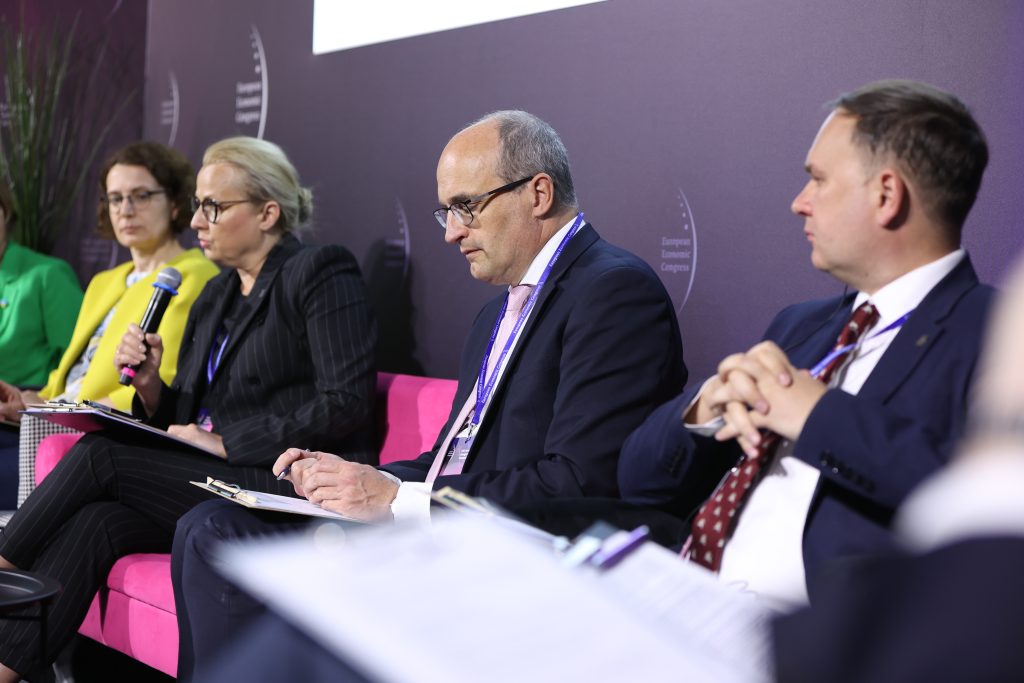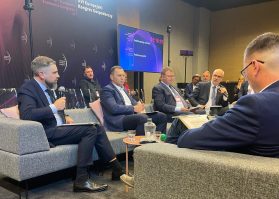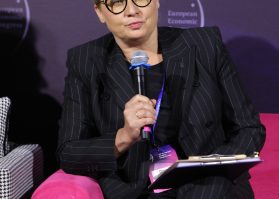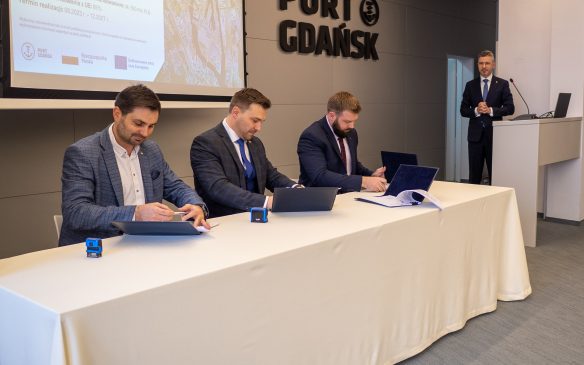EEC: transport infrastructure geared towards sustainable economic development and security

‘The most important thing is to strengthen Polish ports in terms of infrastructure They are crucial for the transport of cargo, including when it comes to the reconstruction of Ukraine. That war will end one day,’ said Dorota Pyć, president of the Port of Gdańsk, during the 16th European Economic Congress in Katowice. According to experts, the construction of an effective transport infrastructure in Central Europe requires international partnership and the involvement of public and private funds to ensure not only economic development, but also the security of citizens.
In a panel discussion on the importance of modern transport infrastructure in Central Europe, the experts indicated that, apart from the financial and climate factors, the geopolitical situation also has a significant impact on the direction of transport networks in our region. Namely, Russia’s aggression against Ukraine and threats against the Baltic States, Poland and other NATO members.
As Dorota Pyć, president of the Port of Gdańsk, pointed out not so long ago, investments in transport infrastructure were designed and implemented mainly with climate protection in mind and aimed at reducing gas emissions and developing green road, rail and maritime transport.
‘Today, apart from the ambition to decarbonise transport in line with the Green Deal, the issue of security in the face of the threat of war is also of great importance,’ said Dorota Pyć. She reminded us that the philosophy of creating the TEN-T trans-European transport network and intermodal transport is also linked to security in case of war.
She pointed out that the Port of Gdańsk, which she manages, is crucial when it comes to providing security. Due to its intermodal potential, it serves as an interface between three different modes of transport.
‘This is why it is extremely important to have the possibility of building a second railway bridge, to connect the deep-water part of the Gdańsk port with the mainland. We should remember that this part of the port is located on an island and there is only one bridge leading to it,’ she said.
She explained that such an investment is important when it comes to ensuring the military security of our country, but it will also be crucial in the process of rebuilding Ukraine.
Jan Sechter, former ambassador of the Czech Republic in Poland, spoke about the strategic importance of Polish ports in the context of supply chain security as it serves, for example, the defence industry.
‘The Czech Republic is a part of the Three Seas region, a member of NATO, and also a participant in key European defence projects. From our point of view, the most important thing is to complete the cross-border railway connections and to link them with the ports of Gdańsk and Szczecin, as both are particularly important for our defence industry,’ he said.
He added that European ports, especially the ports of Hamburg and Rotterdam, are increasingly envious of the flourishing partnership between Czech companies and the Port of Gdańsk and the Ports of Szczecin-Świnoujście.
Dorota Pyć responded by reiterating that a symbol of the excellent Czech-Polish partnership in this area is the next celebration of the Polish Maritime Day in Prague, organised by the Polish Chamber of Maritime Commerce.
Julius Skačkauskas, Deputy Minister of Transport and Communications of Lithuania, also spoke about the need to create a European transport network that meets the needs for military mobility. He emphasised that it had been obvious to Lithuania since 2014 that it was necessary to build a common infrastructure network for military mobility in case of war. ‘The EU realised this back in February 2022’, he added.
He pointed out that the railway investments in his country, which are carried out with NRP funds, for example, take into account the security factor.
During the discussion, the experts also raised the issue of financing the construction of an efficient transport infrastructure, allowing us to protect the climate and ensure security.
As Magda Kopczyńska, Director General for Mobility and Transport (MOVE) in the European Committee pointed out, investments in transport infrastructure are very costly and time-consuming, especially when they have to be integrated into a European network.
‘A couple of years ago, we understood that building roads, railways and ports requires not only public but also private funds. Nobody can afford now to build such facilities solely with public funds, even in Western Europe,’ she said.
Magda Kopczyńska added that she knows of many infrastructure projects 50% financed by public funds and 50% by funds obtained from the private market.
‘There is no need to always finance every infrastructure project entirely with valuable public funds. Especially in the case of projects that have revenue potential and can attract private capital,’ she explained.
The importance of funds from the National Reconstruction Plan for Poland, which have been unblocked after more than two years, could not be overlooked in the context of financing infrastructure investments.
Funds from the NRP will be transferred to Gdańsk, for example. As Dorota Pyć pointed out, an installation terminal for offshore wind energy could be built on the land managed by the Port of Gdańsk.
‘It is my dream to make the Port of Gdańsk an energy centre. Preparatory and design work to launch offshore wind farms in the Polish exclusive economic zone has been going on for more than a decade. Installation ports are needed to turn this dream into reality. NIP includes funds specifically for this purpose. From a strategic perspective, it is important that such an installation infrastructure is built in the Port of Gdańsk, which due to its depth parameters is best suited to perform this function. This is one of the elements of building an energy centre in Gdańsk. I think that support for such a direction should come from many directions – including the public sector and private entities. It aligns with the decarbonisation and zero carbon objectives. We have many values that relate to the importance of minimising the negative effects of climate change,’ said Dorata Pyć.
As the head of the Port of Gdańsk said, this is also an essential element of the implementation of the Green Deal.
The situation of Polish seaports was also discussed during the first ‘Polish Seaports’ panel. The panellists admitted that geopolitics have a strong impact on the maritime business.
‘The situation has forced seaports to change a lot. Supply chains have been completely disrupted. Transport has shifted to rail and is no longer heading to Russia, but to Ukraine and in southerly directions,’ said Stefan Rudnik, director of the Investment Division of the Port of Gdańsk.
He stressed that, in view of the radically changing situation, the Management Board were taking the steps necessary to ensure that, for example, the city was not blockaded. The area has been hardened and several hundred truck parking spots have been built – in total there are around 1,000 of them now.
‘Energy centres and the importance of the strategic supplies of liquid fuels and gas are shifting to northern Poland, to the ports. Therefore, together with Naftoport, we plan to build the 6th fuel handling station. It is intended to be ready by the end of 2028. We already have an environmental decision, and the station is now at the design stage. We are strengthening our position as a port of strategic importance in terms of energy security,’ he added.





